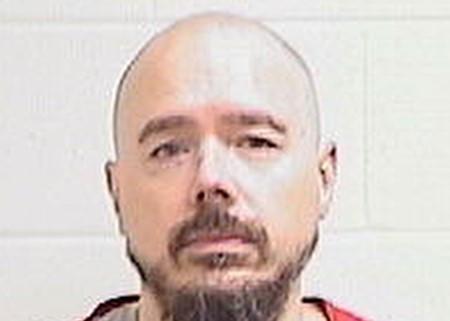CBS News
Indiana conducts first execution in 15 years, puts quadruple killer to death

Michigan City, Indiana — An Indiana man convicted of killing four people including his brother and his sister’s fiancé decades ago was put to death Wednesday, without any independent witness, marking the state’s first execution in 15 years.
Joseph Corcoran, 49, was pronounced dead at 12:44 a.m. CST at the Indiana State Prison in Michigan City, Indiana, the Indiana Department of Correction said in a statement. CBS Indianapolis affiliate WTTV reports that officials said the execution process started just after midnight.
Indiana Department of Corrections via AP
Corcoran was scheduled to be executed with the powerful sedative pentobarbital, but the state agency’s statement did not mention that drug. Corcoran’s execution was the 24th in the U.S. this year.
According to WTTV, the statement said Corcoran told officials his last words were, “Not really. Let’s get this over with.”
He was convicted in the July 1997 shootings of his brother, 30-year-old James Corcoran, his sister’s fiancé, 32-year-old Robert Scott Turner, and two other men, Timothy G. Bricker, 30, and Douglas A. Stillwell, 30.
According to court records, before Corcoran fatally shot the four victims he was under stress because the forthcoming marriage of his sister to Turner would necessitate moving out of the Fort Wayne, Indiana, home he shared with his brother and sister.
While jailed for those killings, Corcoran reportedly bragged about fatally shooting his parents in 1992 in northern Indiana’s Steuben County. He was charged in their killings but acquitted.
Last summer, Gov. Eric Holcomb announced plans to resume state executions following a yearslong hiatus marked by a scarcity of lethal injection drugs nationwide.
The state provided limited details about the execution process, and no media witnesses were permitted under state law.
Indiana and Wyoming are the only two states that do not allow members of the media to witness state executions, according to a recent report by the Death Penalty Information Center.
Corcoran’s attorneys had fought his death penalty sentence for years, arguing he was severely mentally ill, which affected his ability to understand and make decisions. This month, his attorneys asked the Indiana Supreme Court to stop his execution but the request was denied.
Corcoran exhausted his federal appeals in 2016. But his attorneys asked the U.S. District Court of Northern Indiana last week to stop his execution and hold a hearing to decide if it would be unconstitutional because Corcoran has a serious mental illness. The court declined to intervene Friday, and the U.S. Court of Appeals for the 7th Circuit did the same Tuesday.
Corcoran’s attorneys then asked the U.S. Supreme Court issue an emergency order halting his execution, but the high court denied their request for a stay late Tuesday, ending Corcoran’s options with the courts.
His sole remaining hope then became Holcomb, who could have commuted Corcoran’s death sentence. But that commutation never came and the execution proceeded as scheduled.
WTTV says Holcomb issued a statement saying Corcoran’s case “has been reviewed repeatedly over the last 25 years – including 7 times by the Indiana Supreme Court and 3 times by the U.S. Supreme Court, the most recent of which was tonight. His sentence has never been overturned and was carried out as ordered by the court.”
Indiana’s last state execution was in 2009 when Matthew Wrinkles was put to death for killing his wife, her brother and sister-in-law in 1994.
Since then, 13 executions were carried out in Indiana, but those were initiated and performed by federal officials in 2020 and 2021 at a federal prison in Terre Haute.
State officials have said they couldn’t continue executions because a combination of drugs used in lethal injections had become unavailable.
For years, there has been a shortage across the country because pharmaceutical companies have refused to sell their products for that purpose. That’s pushed states, including Indiana, to turn to compounding pharmacies, which manufacture drugs specifically for a client. Some use more accessible drugs such as the sedatives pentobarbital or midazolam, both of which, critics say, can cause intense pain.
Religious groups, disability rights advocates and others have opposed his execution. About a dozen people, some holding candles, held a vigil late Tuesday to pray outside the prison, which is surrounded by barbed wire fences in a residential area about 60 miles east of Chicago.
“We can build a society without giving governmental authorities the right to execute their own citizens,” said Bishop Robert McClory of the Diocese of Gary, who led the prayers.
Other death penalty opponents also demonstrated outside the prison Tuesday night, some holding signs that read “Execution Is Not The Solution” and “Remember The Victims But Not With More Killing.”
“There is no need and no benefit from this execution. It’s all show,” said Abraham Borowitz, director of Death Penalty Action, his organization that protests every execution in the U.S.
Prison officials said in a brief statement Tuesday evening that Corcoran “requested Ben & Jerry’s ice cream for his last meal.”
Corcoran said farewell late Tuesday to relatives, including his wife, Tahina Corcoran, who told reporters outside the prison that they discussed their faith and their memories, including attending high school together. She reiterated her request for Indiana’s governor to commute her husband’s death sentence.
Tahina Corcoran said her husband is “very mentally ill” and she didn’t think he fully grasped what was happening to him.
“He is in shock. He doesn’t understand,” she said.
CBS News
Page Not Found: 404 Not Found
The page cannot be found
The page may have been removed, had its name changed, or is just temporarily unavailable.
Be the first to know
Get browser notifications for breaking news, live events, and exclusive reporting.
CBS News
Details on bill to avert government shutdown

Watch CBS News
Be the first to know
Get browser notifications for breaking news, live events, and exclusive reporting.
CBS News
Explosion kills 2 Mexican soldiers in suspected booby trap by drug cartel after troops found dismembered bodies

An improvised land mine apparently planted by a drug cartel killed two Mexican soldiers and wounded five others, Mexico’s defense secretary said Tuesday. Before the blast, the soldiers had discovered the dismembered bodies of three people, officials said.
Gen. Ricardo Trevilla acknowledged that the army had already suffered six deaths from such improvised explosive devices, or IEDs, between 2018 and 2024. But he didn’t specify whether those six had been killed by bombs dropped from drones, or by buried roadside bombs, both of which have been used by gangs in Mexico.
Trevilla said that devices like the one that exploded Monday were “very rustic,” and officials in the past have described them as similar to buried pipe bombs. There was no immediate information on the condition of the five wounded in the attack, which included at least one officer.
Trevilla’s description of the location where the two soldiers died Monday in the western state of Michoacan suggested that it may have been a sort of grisly drug cartel booby trap.
Trevilla said the army sent out a patrol to check on reports that there was an encampment of armed men in a rural area. The armed forces detected an area protected by stockades that appeared to be an encampment, but when soldiers approached in vehicles, they found the trail blocked by logs, so they descended and had to approach on foot.
While approaching, they spotted three dismembered bodies near the encampment, which appeared to be abandoned. But as they drew closer, a buried device exploded and struck the soldiers.
Trevilla blamed the blast on the United Cartels, an umbrella group that includes the local Viagras gang, which has been fighting bloody turf battles against the Jalisco cartel in Michoacan for years.
In August, the Mexican army acknowledged that some of its soldiers have been killed by bomb-dropping drones operated by drug cartels.
Previously, officials have said the army encounters far more roadside bombs than drone-dropped ones.
The Jalisco drug cartel has been fighting local gangs for control of Michoacan for years, and the situation has become so militarized that the warring cartels use roadside bombs or IEDs, trenches, pillbox fortifications, homemade armored vehicles and sniper rifles.
Nemesio Oseguera-Cervantes, also known as “El Mencho,” the leader of the Jalisco cartel, which the officials described as “one of the world’s most violent and prolific drug trafficking organizations.” The United States and the State Department has offered a $10 million reward for his capture.
In the only previous detailed report on cartel bomb attacks in August 2023, the defense department said at that time that a total of 42 soldiers, police and suspects were wounded by IEDs in the first seven and a half months of 2023, up from 16 in all of 2022.
Overall, 556 improvised explosive devices of all types – roadside, drone-carried and car bombs – were found in 2023, the army said in a news release last year.








